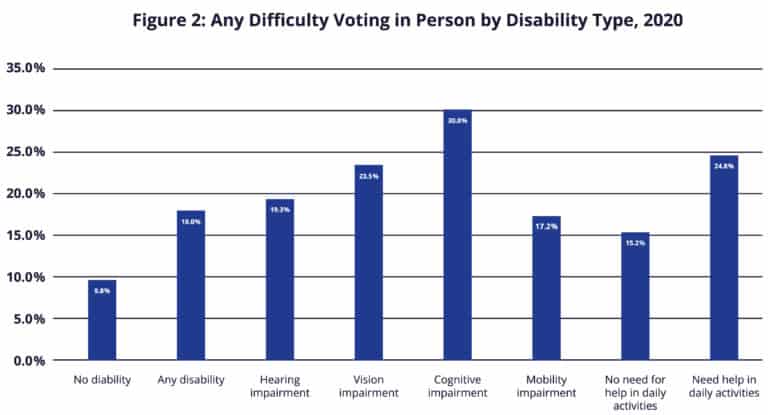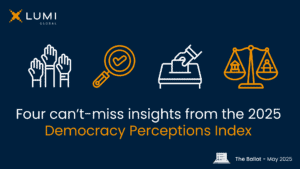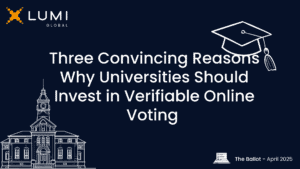One of the strongest arguments in favor of more widespread access to electronic voting is the chance to improve and simplify the balloting process for communities that have long been underserved by existing systems. For people with disabilities, the international conversation about mobile voting represents a chance to change some longstanding areas of frustration. More accessible voting solutions are hugely important to members of the disability community, especially considering the impact political and social activism has on improving accessibility in all of our daily lives.
Let’s look at three areas where expanding online voting can make a significant impact for voters with disabilities.
1. Easier voter registration
The process of voting begins with voter registration, and so do the challenges for voters with disabilities. This is an area where internet-based voting systems have a real opportunity to level the field. Whereas existing voter registration sites that attempt to accommodate disabled voters are often retrofitted with makeshift accessibility solutions, new mobile voting tools will be designed with accessibility and usability as front-of-mind considerations. Voting apps with built-in features such as keyboard navigation, fully labeled form fields, contrasting colors, and compatibility with assistive technology can make a world of difference for many voters. By incorporating accessible design from the start, and also allowing voters to register from their own devices, app-based online voting solutions stand to remove some major roadblocks.
Embracing online voting can have a big impact on accessibility in areas where existing technologies have consistently fallen short. Traditional paper-based registration forms can be difficult for many disabled voters to complete without assistance, so the increased availability of online registration is a generally positive development. Even so, while around 60% of countries worldwide now allow some manner of online voter registration, digital accessibility remains a major issue in many of them. Filling out standard online forms can be hard for voters with cognitive, visual, and physical disabilities.
People with vision impairments need sites which are compatible with screen-reader technology and include meaningful alternative text for all images and graphics. A website that does not allow users to resize text, adjust color contrast, or navigate with keyboard controls will be essentially unusable for many disabled voters. These are all fairly basic tenets of accessible web design, but they too often go unheeded by government websites hampered by limited funds and outmoded site infrastructure. While a number of countries, including the United Kingdom, Germany, Ireland, and Sweden have made great strides in creating websites that can be used by people of all abilities, many other countries, states, and municipalities continue to lag behind. This can make it difficult or impossible for people with disabilities to complete their registration, and can drive people to simply give up on voting out of frustration.
2. Alternatives to polling places
One of the biggest potential benefits of online voting for disabled voters is increased autonomy over their own participation in the political process. For voters with disabilities who cannot or would prefer not to deal with the inherent difficulties found in traditional polling places, the option of casting a secure ballot from their personal mobile device can be a life-changing alternative. Rather than going out to voting sites that often lack proper resources and relying on poll workers who may not be knowledgeable in accessibility issues, an online voting application gives voters of all abilities control over their own situations.
The ability to offer the opportunity to vote remotely is vital as accessibility in polling places is a widespread issue impacting voters around the world. The European Disability Forum is filled with anecdotes from voters with a wide range of disabilities who express an equally wide range of concerns about the facilities available to them. Some of those concerns include:
- Lack of accessible voting booths
- Stairs and other physical barriers
- Lack of accessible campaign materials and voter information
- Lack of accessible parking at polling places
- Limited availability of public transit to polling places
- General transportation difficulty for voters in rural or remote locations
While in-person voting is certainly more accessible than it has been in the past, there are clearly a number of issues still waiting to be resolved. For one, communities such as recent immigrants and ethnic minorities that are generally underserved by existing voting systems also tend to have higher rates of disabilities, which further compounds issues surrounding accessibility. Postal voting has proven to be an effective alternative for many voters. In the 2020 election in the U.S., for example, more than half of voters with disabilities cast their ballots by mail. Online voting systems take the security and convenience of postal voting to the next level by putting the voting experience under the control of people who understand their own needs and abilities.
This diagram shows the difficulty in voting broken down by disability type. Almost one-third of people with cognitive impairments (30%) reported difficulty in voting at a polling place, although the rates of difficulty were also high for other disability types, particularly those needing help in daily activities (25%) and with vision impairments (24%)
Source: Disability and Voting Accessibility in the 2020 Elections: Final Report on Survey Results

3. Reduced discrimination and privacy concerns
Continuing with the theme of personal empowerment, online voting also represents a potential leap forward in privacy and equal treatment for all voters. A secure online voting system would allow voters to handle the entire process from their personal computer or connected device, from registration to researching issues and candidates to casting an electronic ballot. This technology could revolutionize participatory democracy for voters of all ilks, though especially for voters with disabilities who far too often find themselves disenfranchised by systems which are not equipped to serve their specific needs.
Despite advancements in technology and society, people with disabilities still face discrimination and stigma in many public spaces, including polling places. Even in spaces that provide access and usable accommodations to disabled voters, many people are understandably uncomfortable with subjecting themselves to the public scrutiny that can come with casting their ballots in the traditional manner.
In many cases, poll workers are volunteers who have not received training in how to operate accessible voting equipment or interact with disabled voters. Some voters have had traumatic experiences with discrimination at polling places, ranging from other voters expressing annoyance to staffers being unable to open wheelchair-accessible entryways to poll workers announcing a voter’s disability to the entire room. Some voting sites require people with vision disabilities to accept assistance from onsite administrators, with no guarantee that their wishes will be followed. In some places, voters with mental disabilities are subjected to tests which supposedly determine their competence for voting.
Rather than subject themselves to that kind of indignity and embarrassment, it is no surprise that some voters with disabilities opt to avoid the process of going out to a public polling place altogether. The privacy and personal autonomy of mobile voting apps can help to empower those voters while maintaining the integrity of national, regional, and local elections.
Assembly Voting is dedicated to modernizing the election process for all voters by building secure, accessible electronic balloting systems. Find out more about the ways Assembly Voting is working to protect democracy and preserve the integrity of electoral processes around the world here.


